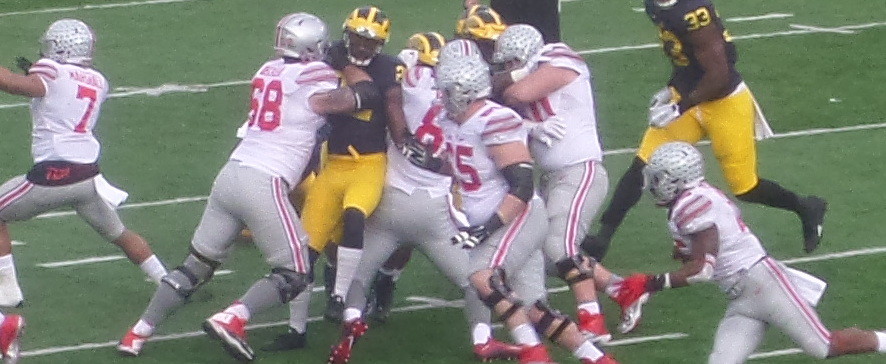Miami, Florida – The NCAA granted Miami Hurricane TE Cam McCormick a ninth year of eligibility to play football in 2024. We admire Cam’s fortitude and persistence. Austin Cartwright reports about this initially in his January 18 article in USA Today Network. Please read his article by clicking here. This writer of “Steveo’s Salvos” can identify with the player’s feelings. Having sat out after a transfer (for struggling with calculus at my first school, a D1 for which I did not play), practicing a season while ineligible to play at the DIII level, and suffering an ACL/meniscus injury in spring club lacrosse in the mid-’70s to give me one season left to play football, I can relate to his desire to continue to play.
However, with no scholarships at that level and no more extended waivers, there was no option for me to stay just to play football. I can understand his feelings. I still wanted to play on the team if I could. However, questions remain here primarily regarding NCAA policy today affecting playing eligibility.
Oregon Duck
McCormick was a three-star pick back in 2016 selecting to start at the University of Oregon. He red-shirted for 2016 season for contracting rhabdomyolysis after a strenuous offseason workout. This occurs when “damaged muscle tissue releases its proteins and electrolytes into the blood.” It can be fatal. According to USA Today Network’s article, he broke his left ankle in 2018. The severity of the injury put him out of action through the 2020 season. Upon return for the Ducks in 2021, he tore his right Achilles tendon in the second game. With Oregon Head Coach Mario Cristobal moving on to Miami, McCormick followed him. He played for the Hurricanes in 2022, and caught ten passes for 66 yards and three TDs. In 2023, he caught eight passes for 62 yards. He applied for two more seasons of eligibility even before he transferred to Miami. The NCAA granted him both.

Upon further review of eligibility
To Cam McCormick’s credit, despite his injury and sitting out more two seasons as a result, he got his bachelor’s degree at Oregon. In addition, he not only got is bachelor’s in advertising, he got his Master’s degree at Oregon in June 2022 as shown here on X, formerly known as Twitter. Now this is what college football is supposed to be about. As a student-athlete took advantage of his football ability to get not only one degree, but two! He achieved thus despite his football injuries. Cam will turn 26 in April. In 2023, the Miami roster indicates that he is a redshirt senior. Academically, he’s beyond a graduate student.
With his personal stats and physical history, it seems likely that pro football is not where he’s headed. Is he at risk re-injuring himself? And if he does, will he be granted a tenth year? At some point, Cam’s going to have to move on to a new career he’s qualified for. If he’s as dedicated and persistent to his career as he’s demonstrated for football, he’ll go places however he decides to build on his studies.
Time to move on?
He’s got two degrees after eight years of college. At this point, how can anyone justify a ninth year of college football playing eligibility. Is he getting a ninth season of scholarship money for playing football? If so, is what degree is he currently studying for? Shouldn’t he, the school and the NCAA decide it’s time to give some other deserving student-athlete coming out of high school to start working on his future? Cam McCormick has made great decisions to get to where he is today. However, I have bigger concern regarding the NCAA’s waiver decision in this matter. You can read it about it in my recently released book, Fifty Years of Tailgate Tales: The Good, the Fun and the Ugly, now available through my Author page on Amazon.com.
Alternative NCAA motive?
The NCAA seems to be testing the waters to see how long they can offer waivers to athletes in order to retain them for a longer-term goal. Can they possibly be looking to employ recruited student-athletes as full-time employees after eligibility just to play football? In particular, do they desire to compete financially with the NFL? They seem close to getting there any time now. They possibly desire to retain such employees will help them maintain the success of their product on the field. Why? Possibly, to raise more money, but not just to fund their athletic departments. NCAA members and colleges in general now seem to seek to fund other agendas, some worthwhile and some for very political objectives.
Hidden Eligibility Agenda
You can read more about this in my book. It’s an agenda that is already well underway. This seems like an ongoing a move in testing the waters – first a sixth year of eligibility for Covid. Now, can they get seven, eight and nine years based on waivers to retain more talent? Evidently, yes. If they can keep the talent recruited beyond four or five years and eventually to employ them, there’s no turning back. A good number of Football Bowl Subdivision (FBS) schools in newly aligned super conferences will build on their Saturday TV monopolization. The NFL now owns Sundays to the tune of $18 billion annually.
A certain faction of Institutions of Higher Learning is already testing the waters for a comparable benefit. They already have a solid infrastructure through the media contracts, large stadiums, and major alumni funding (de facto ownership) in place. Be ready for super conference members to leave the NCAA sooner than anyone could imagine. Get Fifty Years of Tailgate Tales for more details. The plan is already in place.

Steve Koreivo- ed.
